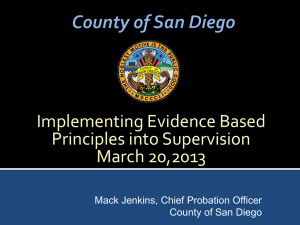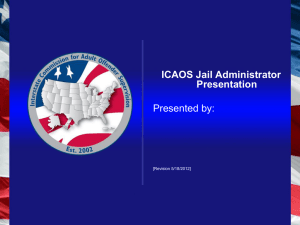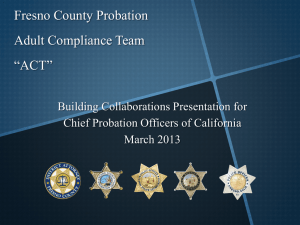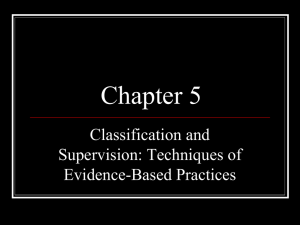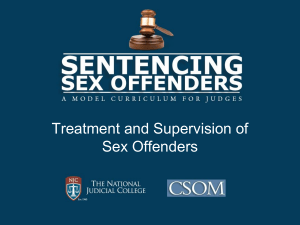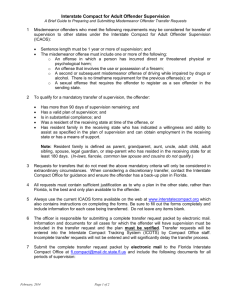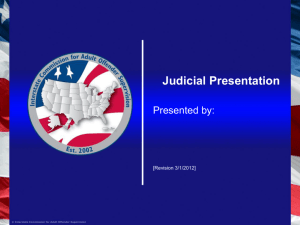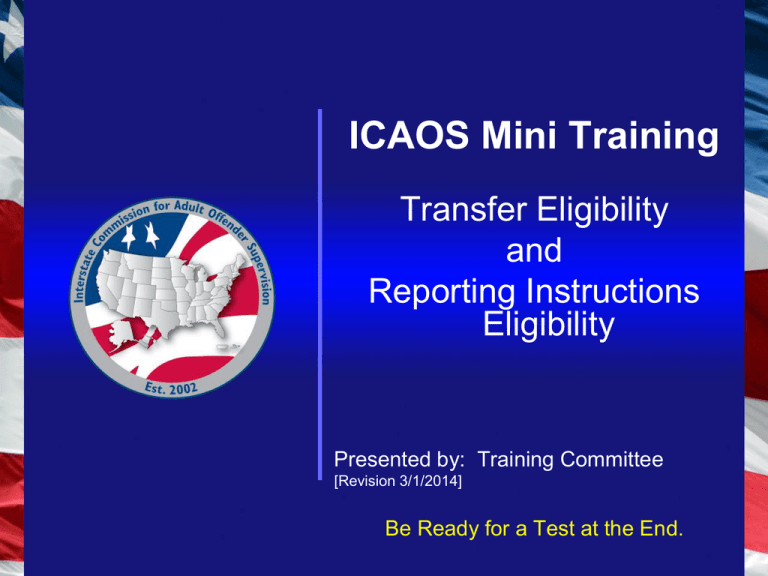
ICAOS Mini Training
Transfer Eligibility
and
Reporting Instructions
Eligibility
Presented by: Training Committee
[Revision 3/1/2014]
Be Ready for a Test at the End.
Training Objectives
• Eligibility Criteria
– Definition of ‘Offender’
– Definition of ‘Supervision’
– Offenses covered
– Mandatory versus Discretionary Transfer
• Reporting Instructions Criteria
– Offenders must qualify for reporting
instructions
Purpose of ICAOS
• Promote Public Safety
• Protect the Rights of Victims
• Effective Supervision/Rehabilitation
• Control Movement of Offenders
• Provide for Effective Tracking
The Interstate Compact for Adult
Offender Supervision
• Courts, Parole Boards, Community
Corrections & other Executive Agencies
– subject to ICAOS rules
– MUST enforce & effectuate the Compact
Do you know your
state’s statute?
What Triggers the Compact?
No state shall permit an offender who is eligible for
transfer under this compact to relocate to
another state except as provided by these rules.
Rule 2.110
“Relocate”
– “Relocate” means to remain in another
state for more than 45 consecutive
days in any 12 month period.
Rule 1.101 definitions-Rule 2.110
“Offender”
Adult who commits a criminal offense AND
– Is subject to supervision;
– Released to the community under jurisdiction
of:
• Courts
• Paroling Authorities
• Corrections
• Other Criminal Justice Agencies; AND
– meets eligibility requirements
“Supervision”
• Has 2 distinct criteria:
– Oversight exercised by a controlling authority,
which includes Courts, Parole Boards, etc…
– Required to monitor regulations or conditions,
other than monetary.
Eligible Offenders Must Transfer to
Relocate
Eligible Offenders
All Felons
Certain Misdemeanants (Rule 2.105)
Non-eligible Offenders
Certain Misdemeanants (Rule 2.105)
Next Slide
Deferred Sentences (Rule 2.106)
• Is there a finding of guilt?
• Has a plea been entered?
• Given up the right to trial?
Those on work-release (Rule 2.107)
• Or released under furlough
• Or on a pre-parole program
• Those on a Pre-Trial Intervention
Programs
“Unsupervised” Offenders requiring
monitoring
• Bench Probation
Offenders released on bail
Eligible Misdemeanants
Sentence = 1+ years of supervision
AND
Instant Offense includes one or more:
Person incurred direct or
threatened physical or
psychological harm.
2nd or subsequent offense of
driving while impaired by drugs
or alcohol
Use or possession of a firearm
involved.
Sex offense requiring registration
in the sending state
Rule 2.105
2 Types of Transfers
• Mandatory – if the offender meets the criteria to
transfer, the receiving state MUST accept supervision
• Discretionary –
• Offenders not eligible for mandatory transfer
• Sending state must justify “WHY”
• Receiving state has the discretion to accept or
reject supervision
Transfer Requirements
Decision to transfer is solely at the discretion of the sending
state. An Offender shall be eligible and the receiving
state shall accept transfer, if the offender:
a)
b)
c)
d)
e)
Has more than 90 days of supervision remaining; and
Has a valid plan of supervision; and
Is in substantial compliance in the sending state; and
Is a Resident of the Receiving State; or
(1) has resident family in receiving state who are willing to
assist and have the ability to assist. and,
(2) can obtain employment or has means of support
Rule 3.101
Reasons & Justification for
Transfer
• Resident: inhabited one year prior to offense
• Resident Family: Parent, grandparent, aunt, uncle, adult child, adult
sibling, spouse, legal guardian, or step-parent
– Inhabited receiving state for 180 calendar days
• Employment Transfer: At the direction of employer as a condition of
maintaining employment
Rule 3.101, 3.101-1 & 3.101-2
Discretionary Transfers
• Provide sufficient documentation to justify the requested
transfer.
• The receiving state has the discretion to accept or reject
the transfer of supervision in a manner consistent with
the purpose of the compact
– Public Safety
– Rehabilitation of Offenders
Rule 3.101-2
Is there a difference between
the criteria for a Transfer
Request and the criteria for
Reporting Instructions?
Reporting Instructions
Offender must qualify for Reporting Instructions
Reporting Instructions for Sex Offenders
Living in the Receiving State at the
Time of Sentencing
• Rule 3.103 applies except for the following:
– 5 business days to respond
• Invalid residence – may deny Reporting
Instructions
– Travel permits are NOT permitted w/o
approved Reporting Instructions
Rule 3.101-3
Living in Receiving State vs.
Compact Definition of Resident
Mandatory RI’s for Living in
Receiving State
• The offender currently lives in
the receiving state when
sentenced to probation in the
sending state and needs to go
home after sentencing.
Mandatory Transfer for
‘Resident’
• The offender must have lived in
the receiving state for at least
one continuous year prior to
committing the offense in the
sending state
Notices of Departure & Arrival
• Fastest Processes in ICOTS!
Sending State
NOD when offender departs
Receiving State
NOA when offender arrives and reports as
instructed.
• Officer becomes the ‘supervising user’
in ICOTS
Failed to Report?
• Submit a NOA and follow up with a
Case Closure Notice
Rule 4.105
Liability
• Liable is defined by Webster as “Legally
obligated; responsible…”
• All compact member states can be held
liable for circumventing or violating the
ICAOS rules.
• ICAOS rules are federal law and there is a
legal obligation to follow and enforce the
rules as written.
Transfer of Offenders
• Advisory Opinion 3-2004
– Once an application has been made under
the Compact an offender may not travel to the
Receiving State without the Receiving State’s
permission.
• Advisory Opinion 9-2006
– States which allow eligible offenders to
transfer to the receiving state prior to the
investigation being completed are in violation
of the Compact .
Rule 3.102(b) & Rule 2.110
Scenario #1
The sentencing court in my state has sentenced
an offender to “informal probation” (bench
probation) on a felony conviction for
POSSESSION OF A CONTROLLED
SUBSTANCE which includes standard conditions
of community service work and counseling.
Because the offender has been placed on informal
probation to the court, this case does not fall under
the transfer requirements of the Interstate
Compact.
a) True
b) False
Scenario #2
I am the supervising officer for a felony offender
that has been court ordered to attend substance
abuse treatment in an out-of-state treatment
facility. Since the program is only three months
long and the court has ordered the treatment, I
may give him a travel permit that allows him attend
the program without triggering the rules of the
compact.
a) True
b) False
Scenario #3
An offender commits a crime in the sending state
and then moves to another state with the court’s
permission during the sentencing process. The
offender returns to the sending state for
sentencing and receives three years probation.
The sending state can mark “resident” as the
reason for transfer on the transfer request.
a) True
b) False
Scenario #4
An offender convicted and sentenced to a three
year term of supervision for a misdemeanor
DUI/DWI who has a prior misdemeanor DUI/DWI
conviction from five years ago, is subject to the
Interstate Compact rules.
a) True
b) False
Scenario #5
Following approved reporting instructions and/or
an approved transfer request, the offender departs
and the sending state submits a notice of
departure in ICOTS. Should the offender fail to
report in the receiving state as instructed, the
receiving state should:
a) Submit a compact action request to the sending state advising
that the offender has failed to report as instructed.
b) Submit a Notice of Arrival to the sending state, indicate the
failure to report, and follow up with a case closure notice.
c) Keep the case open until the offender shows up and reports to
their officer in the receiving state.
d) Do nothing. The offender will show up when he is good and
ready.
Questions

